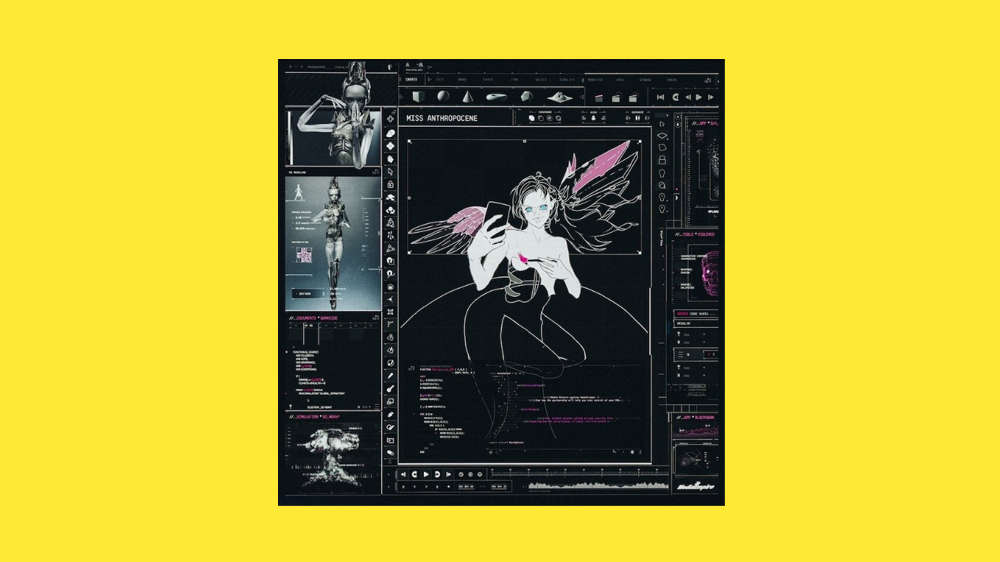Grimes’ ‘Miss Anthropocene’: Album Review
By Jem Aswad
LOS ANGELES (Variety.com) – In the nearly five years since last released an album, her news and social feeds have been so filled with drama, both artistic and real-life (feuding with her record label, her recent announcement that she’s pregnant, and that whole dating-Elon-Musk thing) that it’s threatened to overshadow her music.
And although her recent videos and the description of her third full-length, “Miss Anthropocene,” suggest an amorphous high concept behind it — “about the anthropomorphic Goddess of climate Change” — setting all of that aside and focusing on the music, it’s an innovative, daring and complex outing that shows impressive development from her 2015 breakthrough album, “Art Angels” (you know, the one she has since called “a piece of crap”), particularly since she wrote, performed and produced this one almost entirely herself. It finds Grimes — aka Canadian singer and self-taught musician Claire Boucher — aggressively driving her music into a new realm, and the time, effort, artistic TMI and seeming obsession have paid off.
While “Anthropocene” can be loosely grouped with recent innovative pop albums from artists like Charli XCX and Caroline Polachek, Grimes is following a different path. Where Charli blends discordant, confrontational sounds with pure pop and Polachek twists melodies into intricate shapes, Grimes’ music is hazier, so drenched with echo and effects that it can take repeated listens for some of the songs to emerge — and good luck trying to decipher most of the lyrics, which veer between dark missives about doom and drugs, seeming love songs, a borderline suicide note (the incongruously upbeat “You’ll Miss Me When I’m Not Around”) and even a Smashing Pumpkins reference: “Put on ‘Bullet With Butterfly Wings’/ So that I can sing along while I break things,” she sings on “My Name is Dark” (which we only know because we asked for a lyric sheet).
Yet that mystery and/or inscrutability actually adds to the album’s allure and shelf life — many of the songs reveal themselves gradually, making the listener wonder what else might be lurking in the deeply saturated mix. In many ways, it’s more like an instrumental album, with Grimes’ vocals and melodies floating over the music in a sort of disembodied way that defies singing along — it’s an unusual approach that places the lead vocals more in a supporting, or at least more distant, role than they usually are in a traditional pop setting.
The album leads off with two extremes in that category: The opening “So Heavy I Fell Through the Earth” is a gorgeously ethereal, mid-tempo mood-setter that eases the listener into the album. But the mood changes dramatically as it’s immediately followed by the ominous “Darkseid,” which is driven by chest-rattling bass and increasingly agitated verses (in Mandarin) from guest rapper Aristophanes. Things then change direction entirely with “Delete Forever,” a totally unexpected acoustic ballad, with relatively untreated vocals and clear lyrics over acoustic guitar and electronic drums and bass.
But apart from “Delete,” Grimes generally keeps to a standard sonic format throughout the album — loads of echo, thwacking snare sounds, pulsating bass, soaring and bleeping synths textures — that’s loose enough to give a consistent sound to a wide variety of song styles. The closing track, “IDORU,” is possibly the most ambitious one here, with multiple overlapping, interlocking elements that only reveal their complexity with a close listen.
And although Grimes’ assessment of “Art Angels” is overly harsh, the forceful way she’s moved away from it on “Miss Anthropocene” was arguably necessary. Her ultra-high, almost kewpie-doll-like voice — which sounds autotuned even when it’s not — and previous tendency toward cheerleaderesque hooks wore thin quickly and threatened to become creative dead ends. Here, she’s found ways to reshape and reinvent them — and in the process, open up a whole new realm for herself as an artist.

